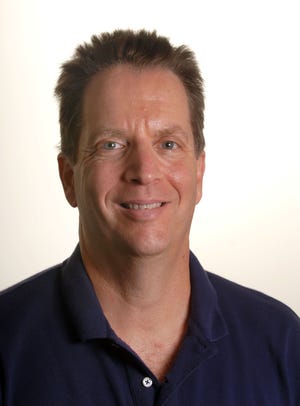Opinion: Democrats’ black base could stunt Mayor Pete’s surge
Pete Buttigieg enters tonight’s debate as a surprise serious contender for the Democratic presidential nomination, the young mayor of a small Midwestern city who’s vaulted to the upper ranks of White House aspirants.

Polls show Buttigieg leading or near the top in both Iowa and New Hampshire, the two electoral curtain-openers that in recent decades have served as springboards to the nomination for candidates from both parties.
Bill Clinton, Barack Obama and John Kerry are among the Democrats who used strong finishes in one or both states to lay claim to the nomination.

This history would appear to auger well for Buttigieg, who is in a stronger position in the two states combined than Clinton, Kerry or Obama were at the same point less than three weeks before the Iowa caucuses.
But even if the South Bend, Ind., mayor finishes strong in Iowa and New Hampshire, a bigger state — and a much bigger problem — stands in his way.
South Carolina’s Feb. 29 primary, coming just 18 days after the New Hampshire vote, could bring Mayor Pete’s campaign to a crashing end.
Recent polls from the three states, released within two days of one another, tell a tale of historic disparity that appears to revolve around the toxic mix of homophobia and racism. In the overwhelmingly white states of Iowa and New Hampshire, Buttigieg is in statistical ties for the lead — polling at 16% in Iowa and 20% in New Hampshire.
But in South Carolina, where blacks make up more than half of the Democratic electorate, the mayor stands at 4%, far behind the Joe Biden-Bernie Sanders-Elizabeth Warren triumvirate, and even trails latecomer Tom Steyer.
The reason for this disparity is something Democrats are loathe to discuss: the unease many African Americans feel about same-sex relationships.

This discomfort, branded “black homophobia” by some gay African Americans, has been expressed from the pulpit in black churches, through the mic in hip hop studios, on the pages of academic journals and even on the streets of Atlanta in a viral video.
When CNN anchor Don Lemon disclosed he was gay in 2011, he said the “big segment of the black community that are homophobic” had made his decision more difficult.
“In black culture, and similar in Latino and other minority cultures, it’s the worst thing you can do as a man,” Lemon said. “In both cultures you have to be a man, and they equate being gay with not being a man.”
Saying “it has a lot to do with religion,” Lemon placed some of the blame on African American ministers.
Horace Griffin, a former black theology professor who’s now an ordained Episcopal minister, wrote in his groundbreaking 2006 book “Their Own Received Them Not”: “There are few arenas where the dread and condemnation of homosexuality is more noticeable than in black church settings.”
Scholars have documented that a main reason AIDS rates are higher among black males than white males is the formers’ reluctance to come out for fear of being ostracized.
“The disparity is not only of African Americans who are disenfranchised from health care, but also the difficulty of social acceptance in the African American community of a gay man of color,” Anthony Fauci, director of the NIH Institute for Allergy and Infectious Disease, said in 2013.
Robert L. Miller Jr., an African American social welfare professor at the University of Albany in New York, interviewed 10 men at length in describing “their need to extinguish their affiliation with the black church as a result of religiously sanctioned homophobia.”
Blacks voted by large margins against same-sex marriage in California’s 2008 statewide ban and in North Carolina’s referendum four years later, both of which were overturned by the Supreme Court’s landmark 2015 ruling legalizing it.
Even now, Rep. Jim Clyburn, the highest-ranking black congressman as House majority whip, says the discomfort lingers, especially among older African Americans. “That’s a generational issue,” Clyburn told Politico in November. “I know a lot of people my age who feel that way. … I’m not going to sit here and tell you otherwise. I think everybody knows that’s an issue.”
Buttigieg hasn’t always helped himself. His comparisons of his struggles to find acceptance as a gay man with blacks’ struggles against racism have annoyed many African Americans.
“That’s where he takes a wrong turn,” said Gion Hollingsworth, a black South Bend native who sells commercial software programs in the Washington, D.C., region. “He actually compares the two experiences. He needs to stop doing that.”
When Hollingsworth visited home over Christmas, he drew sideways glances when he told friends and relatives that he likes Buttigieg for president. Some of the skepticism, he said, is tied to Buttigieg’s controversial 2012 firing of South Bend’s first black police chief over his secret recording of phone conversations among white officers allegedly making racist comments.
But Hollingsworth echoed Clyburn in adding that some older folks in particular are uncomfortable about the mayor’s marriage to husband Chasten Buttigieg.
“It’s definitely an issue,” Hollingsworth said.
James Rosen is a longtime Washington correspondent who’s covered Congress, the Pentagon and the White House.